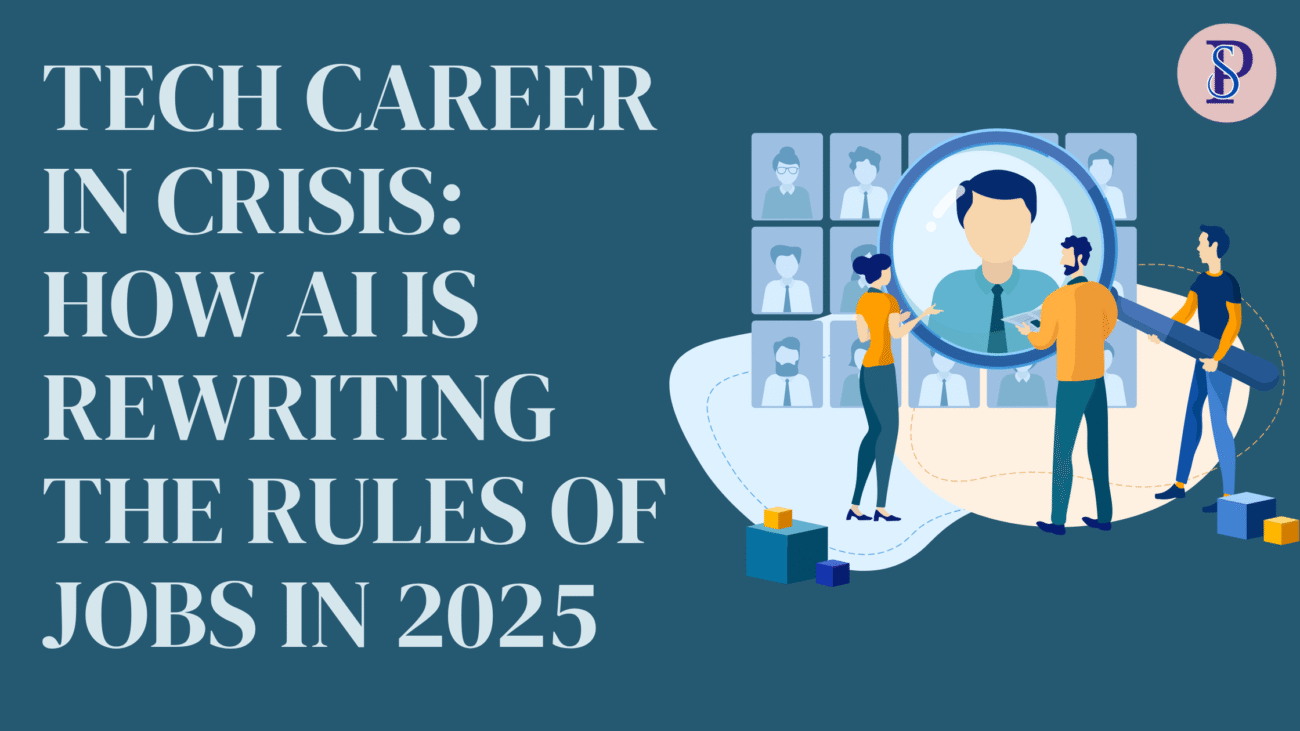Only a few years ago, a tech career was one of the most secure, esteemed, and well-paying careers in the international job market. Jump forward to mid-2025, and the sector is worlds apart. Layoffs, restructurings, and decreasing opportunities for entry-level workers are taking the place of what was then a land of endless opportunities.

With rising computing power and embedding in the core business processes of major technology firms, professionals across the board—ranging from software programmers to product managers—are being forced to redefine their work, retool in haste, or be made redundant.
Table of Contents
A Harsh Reality for Tech Workers
As reported by Layoffs. Fyi, an overwhelming 80,000+ tech employees were laid off by 159 companies alone in July 2025. Microsoft topped the month with 9,000 layoffs, followed by Intel at 5,000 more in the U.S. and Israel. These are just individual cases. Since 2022, close to half a million tech employees worldwide have been laid off. Prior crises such as the 2008 economic meltdown, we saw job loss resulting from economic turmoil. Today, the danger lies in being deeper.
From Assistant to Replacement
It’s worth mentioning that it’s not necessarily about companies getting leaner—it’s about getting AI-first. As of a 2023 Goldman Sachs report, AI can automate 300 million jobs worldwide. The proof is already here.
Between 2022 and 2024, close to 27% of U.S. computer programming positions vanished. Salesforce CEO Marc Benioff recently acknowledged that AI is currently performing 30–50% of the work at his company. Generative code, design, and support tools aren’t just helping workers—they’re displacing them.
Where AI was augmenting a tech career years ago, it’s now pushing professionals to reestablish what a “career in tech” even is.
The End of Big Tech Dreams?
Those days are gone when a career in technology implied a steady rise at a Big Five firm with stock options, fat paychecks, and campus amenities. Now, a lot of those who have been laid off by big companies like Meta, Amazon, and Google are taking jobs at smaller firms, switching industries, or even exiting the tech sector.

There has also been a subtle but powerful movement towards buyouts. Rather than official layoffs, firms such as Google and Meta are providing severance offers instead of voluntary departures. Such steps minimize headcount without incurring the PR tempest—although the net effect is the same: more skilled employees left to scramble for their next destination.
The Shrinking Ladder for Newcomers
One of the most disquieting trends is the depletion of entry-level positions in the tech sector. Statistics indicate a significant drop in vacancies since 2023, sending most recent graduates out into the cold. At mid-2025, the recent tech graduates’ unemployment rate stands at approximately 6%, well over the national average of 4%.
Even those who do get work end up with frozen wages, temporary contracts, or freelance work without benefits or job security. Sites like Fiverr, Upwork, and Toptal have become default zones for displaced professionals, but at the cost of cutthroat competition and uncertainty.
Mid-Career Professionals Are Tackling a Special Crisis
While fresh talent fights to get in, existing midcareer technology professionals are being pushed out. With experience of 10–20 years, extensive experiences ageism, outdated technology skill sets, and trouble in learning new tools or approaches.
Based on reports, almost half of unemployed tech workers still do not have jobs six months later. Women, especially, have been disproportionately affected. The psychological damage of losing a tech job is great—it’s not just a salary that is lost, but also meaning, identity, and status.
People and culture expert Allison Glenn likens layoffs to grief. Writing in a viral LinkedIn post, she said, “Being laid off isn’t just a professional setback—it’s a psychological shock.” Her words speak to the feelings of thousands: being pushed out of a career in tech feels like disappearing from a world that previously accepted them.
Where Are the Jobs Going?
The decentralization of tech talent is well underway. Laid-off professionals are finding work in:
- Healthcare: Creating digital health platforms and patient tools
- Finance: Triaging positions in cybersecurity, risk analysis, and algorithmic trading
- Manufacturing & Logistics: Developing and sustaining smart systems
- Government: The Department of Defense and CISA are just two of the government agencies looking to hire for AI and cybersecurity positions
These perhaps lack the glamour of Silicon Valley but provide stability—and in some instances, a sense of purpose.
The Rise of the Self-Taught and Self-Made
There is a silver lining to all of this. Displaced tech professionals are not twiddling their thumbs. A lot of them are reskilling, switching, or starting their businesses. Edtech platforms like Coursera saw more than 3 million new AI course registrations in 2024, with Gen AI being the most popular skill across sectors.
Google Cloud, AWS, and Microsoft certifications are now table stakes for anyone seeking to remain relevant. In the meantime, 15% of all new technology startups in 2024 were started by employees previously laid off, according to AngelList.
From fintech to edtech to AI software for small and medium-sized businesses, the next generation of builders is being built—one not in Google’s hallways, but through the uncertainty of being laid off.
The New Tech Career Playbook
And what does a successful tech career in 2025 look like? It’s not anymore an issue of working for the biggest firm or earning the most money. Instead, it’s flexibility, constant learning, and flexibility. The modern-day tech worker must have the ability to pivot on a dime—whether that be to learn a new coding language, understand cloud design, or master quick engineering. Lifelong learning is not an option—it’s a necessity.
Conclusion: Reinvention Over Stability
The technology sector isn’t imploding—it’s evolving. AI isn’t only a component of the future of employment; it is the future of employment. To those who have established their identity upon a historical tech job, the shift can be painful, even agonizing. But to those ready to reimagine themselves, those opportunities remain.
The age of job security in technology could be an industry of the past, but a new age of changing, talent-based careers is being created. The rules have changed—but the game isn’t over.
Is the tech sector really in crisis in 2025?
The tech job market is undergoing a period of transformation and retrenchment. Layoffs and restructuring have increased as companies adjust to economic uncertainty and adopt AI and automation, reducing demand for some traditional roles.
Are all tech jobs disappearing?
No. While some roles decline, new opportunities are emerging, particularly in AI engineering, cloud computing, cybersecurity, and product roles that focus on innovation and system design.
How are entry-level tech jobs affected?
Entry-level openings have decreased compared to earlier hiring surges, making it more competitive for fresh graduates. Many new professionals face frozen wages, contract work, or gig roles.
Is there a future for tech careers despite the crisis?
Absolutely. The sector is not collapsing — it’s evolving. Long-term growth continues in high-skill areas like AI research, data science, cybersecurity, robotics, and digital transformation roles across industries.
About the author

S S Dhar
Writer, Editor, Web & Graphics Designer, Teacher,
Product Researcher & Analyst, Digital Entrepreneur.
Visit His Website ssdhar.com
Take a look at his social media to follow & support





